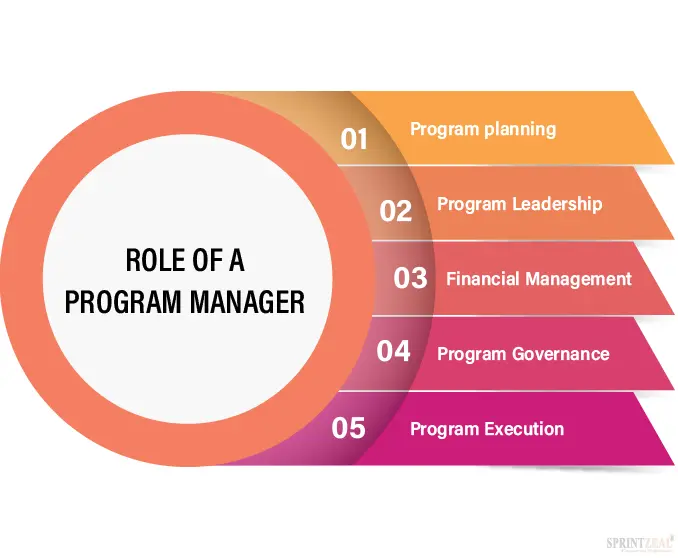
A program manager is a professional responsible for overseeing and coordinating multiple related projects, collectively known as a program, to ensure they align with an organization’s strategic goals. Unlike a project manager who focuses on individual projects, a program manager maintains a broader perspective, managing the interdependencies and ensuring all projects contribute effectively to the overarching business objectives.
What is Program Management?
Program management is the process of managing several related projects simultaneously to improve an organization’s performance. It involves strategic alignment, governance, stakeholder communication, risk management, and benefits realization across all projects within a program. The main goal is to drive organizational transformation and deliver value at scale.
What Does a Program Manager Do?
A program manager leads multiple projects, ensures coordination among project teams, aligns efforts with business goals, mitigates risks, and manages program-level resources and budgets. They focus on delivering benefits and outcomes that wouldn’t be achievable if the projects were managed separately.
Also Read: What is AI Automation? Understanding Its Impact, Tools, and Services
What Do Program Managers Do?
Program managers perform a wide range of tasks, including:
- Defining program objectives and scope
- Aligning projects with strategic goals
- Managing program-level risks and issues
- Coordinating project interdependencies
- Communicating with stakeholders and executives
- Overseeing resource allocation and budgets
- Monitoring and reporting on program performance
Their work ensures that the sum of the projects delivers more value than the individual parts.
What is Program Manager?
A program manager is a senior-level professional who manages a program comprising several related projects. They act as the bridge between strategy and execution, ensuring that every project under their purview aligns with the organization’s long-term goals.
What is the Difference Between Project Manager and Program Manager?
The key difference between a project manager and a program manager lies in their scope of work:
- A project manager handles a single project, focusing on specific deliverables, timelines, and budgets.
- A program manager oversees multiple related projects, ensuring they contribute to broader organizational objectives.
While project managers are tactical, program managers take a more strategic role, focusing on outcomes and long-term value.
| Role | Focus | Scope | Objective |
|---|---|---|---|
| Project Manager | Delivery | Single Project | On-time, on-budget project completion |
| Program Manager | Strategy & Coordination | Multiple Projects | Deliver strategic benefits |
What is a Technical Program Manager?
A technical program manager (TPM) is a specialized type of program manager with a strong technical background. They manage complex technical programs, working closely with engineering teams to drive software development, infrastructure rollouts, or other technical initiatives.
Technical program managers:
- Translate technical requirements into actionable plans
- Facilitate communication between technical and non-technical stakeholders
- Ensure timely delivery of technical milestones
- Understand system architecture, development cycles, and technical constraints
TPMs are critical in tech-driven organizations where both strategic alignment and technical acumen are required.
What is a Risk Management Program?
A risk management program is a structured approach to identifying, assessing, and mitigating risks across an organization or specific program. In program management, it involves tracking risks across all projects and implementing strategies to minimize potential negative impacts.
Key components include:
- Risk identification and documentation
- Risk assessment and prioritization
- Mitigation planning
- Continuous monitoring and reporting
Effective risk management is essential to program success, as it protects resources, timelines, and overall program integrity.
How to Force Close a Program Without Task Manager?
To force close a program without using Task Manager, you can use these methods:
On Windows:
- Alt + F4: Closes the active window.
- Command Line:
- Open Command Prompt (cmd)
- Type
taskkill /im programname.exe /fand press Enter (replace “programname.exe” with the actual executable name)
On macOS:
- Command + Option + Escape: Opens the Force Quit menu.
- Terminal:
- Open Terminal
- Type
killall ProgramNameorkill -9 PID(replace with the actual process name or PID)
These options are handy for troubleshooting unresponsive programs without accessing Task Manager.
Why Are Program Managers Important?
Program managers play a crucial role in organizations by ensuring strategic alignment, optimizing resource use, and managing risks across multiple projects. Their oversight helps deliver integrated outcomes that offer more value than individual project efforts.
Without effective program management, organizations risk misaligned initiatives, duplicated efforts, and underutilized resources.
Core Responsibilities of a Program Manager
- Strategic Planning: Ensure that programs align with business goals.
- Stakeholder Management: Keep communication open and productive.
- Change Management: Handle scope changes and maintain direction.
- Performance Monitoring: Use KPIs to track progress.
- Benefit Realization: Deliver tangible outcomes.
Skills Required to Be a Successful Program Manager
- Leadership: Ability to lead diverse teams across projects
- Communication: Effective at all organizational levels
- Strategic Thinking: Aligning initiatives with business goals
- Problem-Solving: Proactive risk identification and resolution
- Technical Knowledge: Especially for technical program managers
Career Path and Qualifications
To become a program manager, one typically needs:
- A bachelor’s degree in business, engineering, IT, or related field
- Several years of project management experience
- Certifications like PgMP, PMP, or Agile certifications
Conclusion
A program manager is a linchpin in the success of complex, multi-project initiatives. They ensure alignment between execution and strategy, enabling organizations to achieve large-scale goals efficiently. Whether you’re planning to step into program management or are simply curious, understanding the multifaceted role of a program manager is essential in today’s business and tech environments.
By mastering program management, organizations gain a competitive edge, drive innovation, and ensure sustainable success.